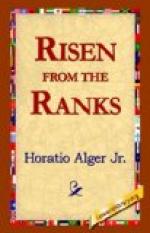“Do you think the chance is good?”
“I don’t know. I hear she’s pretty tight-fisted. But I’ve run on here on the chance of doing something. If she will only make me her heir, and give me five hundred dollars in hand, I’ll go to California, and see what’ll turn up.”
“California!” repeated John Clapp and Luke in unison.
“Yes; were you ever there?”
“No; but we were talking of going there just as you came up,” said John. “An old school-mate of mine has just returned from there with eight thousand dollars in gold.”
“Lucky fellow! That’s the kind of haul I’d like to make.”
“Do you know how much it costs to go out there?”
“The prices are down just at present. You can go for a hundred dollars—second cabin.”
“It might as well be a thousand!” said Luke. “Clapp and I can’t raise a hundred dollars apiece to save our lives.”
“I’ll tell you what,” said Kensington. “You two fellows are just the company I’d like. If I can raise five hundred dollars out of the old girl, I’ll take you along with me, and you can pay me after you get out there.”
John Clapp and Luke Harrison were astounded at this liberal offer from a perfect stranger, but they had no motives of delicacy about accepting it. They grasped the hand of their new friend, and assured him that nothing would suit them so well.
“All right!” said Kensington. “Then it’s agreed. Now, boys, suppose we go round to the tavern, and ratify our compact by a drink.”
“I say amen to that,” answered Clapp, “but I insist on standing treat.”
“Just as you say,” said Kensington. “Come along.”
It was late when the three parted company. Luke and John Clapp were delighted with their new friend, and, as they staggered home with uncertain steps, they indulged in bright visions of future prosperity.
CHAPTER XVII.
Aunt Deborah.
Miss Deborah Kensington sat in an old-fashioned rocking-chair covered with a cheap print, industriously engaged in footing a stocking. She was a maiden lady of about sixty, with a thin face, thick seamed with wrinkles, a prominent nose, bridged by spectacles, sharp gray eyes, and thin lips. She was a shrewd New England woman, who knew very well how to take care of and increase the property which she had inherited. Her nephew had been correctly informed as to her being close-fisted. All her establishment was carried on with due regard to economy, and though her income in the eyes of a city man would be counted small, she saved half of it every year, thus increasing her accumulations.
As she sat placidly knitting, an interruption came in the shape of a knock at the front door.
“I’ll go myself,” she said, rising, and laying down the stocking. “Hannah’s out in the back room, and won’t hear. I hope it aint Mrs. Smith, come to borrow some butter. She aint returned that last half-pound she borrowed. She seems to think her neighbors have got to support her.”




